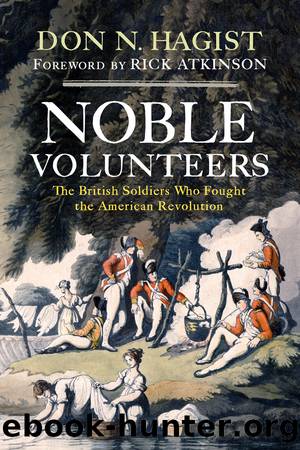Noble Volunteers by Unknown

Author:Unknown
Language: eng
Format: epub
ISBN: 9781594166686
Publisher: Westholme Publishing
Soldier of the 9th Regiment of Foot on campaign, 1777. Regiments in Canada did not receive new clothing in time for the 1777 campaign, so coats and hats from the previous year were cut down and trousers were made from old tents or other linen canvas. Drawing by Eric H. Schnitzer.
General Howe reviewed the proceedings of these plundering trials and disagreed with the verdict for Johnstone and with the sentence for the three men of the 23rd. Military law stipulated that they could not be tried again for the same crime, nor could the commander in chief change the verdict or sentencing. This left Howe no choice but to have all four men released to rejoin their regiments. He stated his disapproval in orders on September 2, giving no reason about Johnstone (presumably he thought the soldier guilty), but declaring âthe Punishment inadequate to their Crimesâ for the three found guilty. Plundering was far too prevalent for corporal punishment to be a sufficient deterrent.33 In the meantime, a few hapless marauders did suffer death for their misadventures, but not at the hands of military justice. An officer recorded on August 31, âTwo soldiers of the 71st regiment were found a little way from the camp with their throats cut. It is supposed they were plundering and were set upon by some lurking rebels.â34 Another officer wrote of that incident and noted another: â2 Grenadiers hangâd by the Rebels with their plunder on their backs.â35
An officer in the Brigade of Guards penned a letter to his sister-in-law on September 1 from âCamp, near the head of Elk River,â mentioning an especially heinous incident: âA soldier of ours was yesterday taken by the enemy beyond our lines, who had chopped off an unfortunate womanâs fingers in order to plunder her of her rings.â He went on, âI really think the return of this army to England is to be dreaded by the peaceable inhabitants, and will occasion a prodigious increase of business for Sr. J. Fielding and Jack Ketch,â36 referring to a real British magistrate and a figurative executioner. No other writer, though, corroborated this event, leaving it unknown whether the soldier was British, German, or Loyalist, or if the event itself was an exaggeration.
As the army moved through the countryside over the next several days, problems continued unabated. On the evening of September 10, Howe finally resorted to the extreme measure threatened eleven days before, ordering the âimmediate executionâ of Andrew Lauder, a soldier drafted from the 1st Regiment of Foot into the 10th Regiment in 1776.37 Lauder was âguilty of the crime of Marauding and detected with plunder upon him,â apparently caught in the act, as there was no trial. A summary execution would surely put an end to wanton behavior. But, unaccountably, the execution never took place. The army was on the move that very night in an operation that culminated in a dramatic victory at the Battle of Brandywine. Perhaps this put Andrew Lauderâs case out of mind; reprieves were normally recorded in general orders, but there was no further mention of him.
Download
This site does not store any files on its server. We only index and link to content provided by other sites. Please contact the content providers to delete copyright contents if any and email us, we'll remove relevant links or contents immediately.
| Africa | Americas |
| Arctic & Antarctica | Asia |
| Australia & Oceania | Europe |
| Middle East | Russia |
| United States | World |
| Ancient Civilizations | Military |
| Historical Study & Educational Resources |
The Light of Days by Judy Batalion(1097)
First Platoon: A Story of Modern War in the Age of Identity Dominance by Annie Jacobsen(957)
Stalin's War: A New History of World War II by Sean McMeekin(882)
The Pacific War 1941-1943 by James Holland(826)
Walk in My Combat Boots by James Patterson(788)
The American War in Afghanistan by Carter Malkasian(768)
Victory's Price (Star Wars) by Alexander Freed(758)
The Vietnam War: An Intimate History by Geoffrey C. Ward & Ken Burns(748)
Blood and Ruins: The Great Imperial War, 1931-1945 by Richard Overy(716)
Operation Pedestal by Max Hastings(708)
Concepts of Space by Jammer Max;(692)
Extreme Fitness by Chris McNab(691)
Cold War (Alexander King Book 2) by Bradley Wright(688)
The Madman Theory by Jim Sciutto(671)
Flying Tiger by Samson Jack(663)
World War II Infantry Fire Support Tactics by Gordon L. Rottman(639)
Pathfinders by AL-KHALILI JIM(636)
Bismarck by Jean-Paul Bled(625)
Panzerkrieg by Mike Syron(622)
